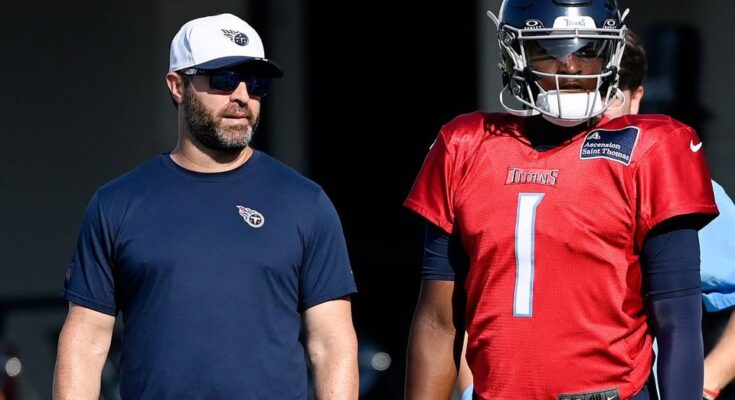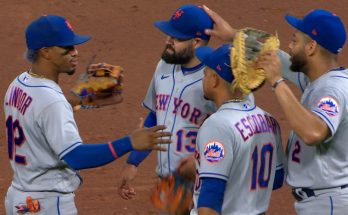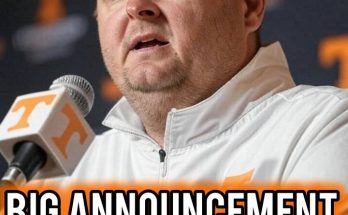The Tennessee Titans have long prioritized efficiency, but there’s a shift happening beneath the surface. While head coach Brian Callahan focuses on adding subtle wrinkles to the system, offensive coordinator Nick Holz is emphasizing a deeper, more philosophical evolution in the team’s approach.
The Tennessee Titans have long built their identity around the principle of efficiency—smart, calculated football with an emphasis on execution and minimizing mistakes. From the days of grind-it-out, smashmouth offense to the methodical precision expected in the passing game, the Titans have consistently leaned on fundamentals and consistency. But as they prepare for the upcoming NFL season, there’s an unmistakable undercurrent of transformation taking shape. What’s happening in Tennessee isn’t a full-blown revolution, but rather a layered evolution—one that’s seeing the team reframe its offensive mindset from the inside out.
This shift is visible in the words and actions of the Titans’ new leadership duo: head coach Brian Callahan and offensive coordinator Nick Holz. While both speak to the same broader goals—improvement, adaptability, and winning—there’s a nuance in how they’re approaching the task. Callahan talks about adding “wrinkles” to an offense that has often been seen as straightforward and predictable, hinting at small innovations that could keep defenses guessing. Holz, on the other hand, is delving deeper, emphasizing what he calls a “philosophical growth” within the offensive structure. It’s a difference in focus that reveals just how seriously the Titans are taking their offensive rebuild.
Callahan’s coaching DNA is rooted in detailed preparation and adaptability. Having served previously as the offensive coordinator for the Cincinnati Bengals, he comes from a background where maximizing the skill sets of his players through subtle scheme changes was a weekly necessity. With Tennessee, he’s bringing that same meticulous approach to the table, but instead of blowing up the offensive framework, he’s layering in new concepts—wrinkles, as he calls them. These may be small pre-snap motions, different personnel groupings, or formation shifts designed to exploit defensive tendencies without requiring a complete overhaul of the playbook.
To Callahan, these wrinkles are the keys to unlocking more explosive plays without sacrificing the efficiency the Titans have historically valued. It’s not about abandoning the team’s identity—it’s about refining it. The wrinkles are, in many ways, an acknowledgment of the evolving nature of the NFL itself. Defenses are faster and more complex, and offenses have to be more dynamic to keep pace. For Tennessee, that means moving away from being overly reliant on the run and injecting more creativity into the passing game. That doesn’t mean abandoning the ground-and-pound style that’s been a Titans hallmark, especially with the presence of power backs in recent years. Instead, it’s about using that reputation as a decoy, then striking in new ways.
But while Callahan works on diversifying the playbook with tactical shifts, Holz is zooming out and looking at the entire offensive philosophy. For Holz, the conversation isn’t just about what plays to run—it’s about why they’re running them and how they’re going to approach each game mentally and strategically. It’s about creating a system that’s not just functional, but fluid. One that can adapt not just week to week, but series to series, even play to play.
Holz has a background that includes time spent under innovative minds in both college and pro football, and he’s making it clear that he views the Titans’ offense as a work in progress—one with the potential to become significantly more sophisticated. He’s pushing for an offense that encourages autonomy and decision-making, especially from the quarterback position, and that demands intellectual engagement from every player on the field. In his view, offensive success isn’t just about execution; it’s about understanding.
This philosophical growth Holz speaks of is especially important given the uncertainty around the Titans’ quarterback position. With Will Levis looking to solidify himself as the long-term starter, there’s an opportunity to mold a young quarterback within a forward-thinking system. Holz’s emphasis on quarterback-led decision-making and adaptability fits perfectly with that mission. He wants an offense where the quarterback isn’t just a passer but a thinker—someone who can manipulate defenses with audibles, reads, and tempo control.
It’s no coincidence that Holz and Callahan are aligned in their belief that the Titans’ offense needs to be more quarterback-centric. That marks a distinct departure from the team’s approach in previous seasons, when the offense largely ran through the running back and play-action passing game. That model served the Titans well when they had an elite back in his prime, but in a league that increasingly values versatility and unpredictability, the old formula was beginning to show its limits.
Under Callahan and Holz, the goal is to find balance—not just statistically between run and pass, but in how the offense presents itself to opponents. The Titans don’t want to be boxed in anymore. They don’t want defenses to assume they can key in on first-down runs or anticipate simple route combinations. They want to be able to operate from multiple personnel groupings, move their weapons around the formation, and keep defenses from settling into tendencies.
That means evolving beyond a playbook that often felt static. Holz and Callahan are encouraging a more dynamic approach to offensive design—one that allows for evolution over the course of a season. That includes the potential use of tempo, more spread formations, and creative route concepts that allow receivers to win in space. These are concepts that were once seen as luxuries for teams with elite quarterbacks and deep receiver rooms. But in today’s NFL, they’re becoming necessities.
It also means empowering the offensive line to do more than just push forward in a straight line. The Titans are expecting more communication, quicker recognition of defensive fronts, and the ability to adjust on the fly. Philosophical growth isn’t limited to the quarterback—it’s spreading across the offensive unit, with each position group expected to think critically and react decisively. That’s a tall order, especially for a team that’s had turnover and youth along the offensive line, but it’s the kind of challenge that comes with shifting from a fixed mindset to a growth mindset.
Players have taken notice. Several veterans have commented on the fresh energy in the building, noting that while the terminology is new and the concepts are more complex, there’s a sense of excitement about what this offense could become. Younger players, particularly those entering their second and third seasons, see the opportunity to develop within a system that rewards mental sharpness and versatility. There’s buy-in, and that’s perhaps the most important first step.
Still, challenges remain. Philosophical growth doesn’t automatically translate into on-field success. The Titans will need time to fully implement these changes, and early growing pains are likely. Execution will be critical, and Holz knows that no matter how advanced the concepts are, they need to be executed at game speed under pressure. That’s why both he and Callahan are taking a collaborative approach to development—pairing schematic innovation with player education and detailed practice reps.
This process will likely be ongoing throughout training camp and into the early part of the season. The offense may look different in Week 1 than it does in Week 8, and that’s by design. Holz wants a system that evolves with its players, not one that’s set in stone before the season even begins. In many ways, the Titans are embracing the kind of offensive flexibility that has become the hallmark of the league’s most successful teams. They’re learning to think differently, to prepare differently, and most importantly, to attack differently.
That’s the essence of what Holz means by philosophical growth. It’s not about being flashy or chasing trends—it’s about building an offense that can thrive in multiple situations, that can pivot when needed, and that can stay ahead of the curve rather than catching up to it. It’s about forming an identity that’s not static but scalable. That’s a dramatic shift from where the Titans have been, and if it works, it could be the foundation of a new era of offensive success in Tennessee.
As for Callahan, he remains focused on the little things—the wrinkles that make a difference in critical moments. But even those wrinkles are part of the bigger picture Holz is drawing. Together, they’re turning the Titans into a more modern, more versatile, and more mentally engaged football team. The blueprint is clear: blend efficiency with innovation, structure with freedom, and toughness with intelligence. If they pull it off, the Titans won’t just be more competitive—they’ll be a whole new kind of threat.



